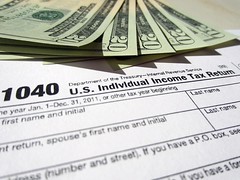Tax Deferred Retirement Income
Being able to live a comfortable life once you retire is easier said than done in today’s economy. Many people who thought they were going to be able to retire were caught off-guard when the financial markets took a turn for the worse. While there are many different investing strategies that you could use to try to be able to live a comfortable retirement, one of the most important factors for you to consider is the tax burden that you’ll have to deal with. If you don’t consider the implication of taxes on your retirement income, it could come back to bite you. Being able to take advantage of tax-deferred retirement income is a good way to improve your chances of success later on.
The Impact of Taxes on Investing

When you put money into regular investment account and buy securities, you have the opportunity to earn returns on those investments. For example, when you buy a stock and it appreciates in value, you make money. When you sell that stock, you realize the gain. The downside to making money as an investor is that you have to pay taxes in the year in which you earn the money. In this example, you would have to pay taxes on the capital gains for your stock in the year in which you sold it. If you are in the 20% tax bracket, 20% of your profit is taken out of your hands and given to the government. If you were able to retain that money and reinvest it, you would be able to buy more securities and make even more money on your next investment. Thus your nest-egg would grow faster and be able to provide a better retirement.
Tax-Deferred Retirement- The IRA/401k Option
Although you do not have this option when it comes to regular investing, the government does give you a break when it comes to retirement investing. By putting your money into a special retirement account, you can take advantage of tax-deferred investing.
For instance, when you put your money into a 401(k) or an IRA, you can invest money on a pre-tax, tax-deferred basis. Meaning, you don’t have to pay taxes on the money that you invested. And any profit that you make from those investments can be reinvested into other securities. This allows you to compound your retirement investments without the impact of taxes. Of course, nothing lasts forever and so when you finally withdraw money from your IRA to actually spend it you must pay taxes at that point.
Tax-Exempt Retirement- The Roth IRA
Although a 401(k) or an IRA makes it possible for you to take advantage of tax-deferred retirement benefits, you can actually go one step better with the Roth IRA. With the Roth IRA, you can actually benefit from tax-exempt earnings.
When you put money into a Roth IRA, you do so with after-tax money. This means that you do not get a deduction on your tax return for the money that you put into the account. However, when you put the money from your Roth IRA into investments and earn a return, you’ll be able to benefit from tax-exempt earnings. You never have to pay taxes on the gains that you realize from your Roth IRA. Once you reach retirement age, and start taking money out of your Roth IRA, you won’t have to worry about they taxes on the money that you withdraw. This is one of the best deals that the government has ever given the retirement saver. But you must be willing to give up the crrent tax break for a future tax-break and many are too focused on the current issue to take advantage of it.
Tax Deferred Retirement- The Insurance Option
Although the Roth IRA is attractive, it’s not for everyone. Unless you make below a certain amount of money, you will not be able to participate in this type of account. If you can’t qualify to participate in a Roth IRA, another option that you may want to consider is putting money into a life insurance policy such as a variable universal policy. With this type of insurance, you can put in more money than what you need to cover the premiums of your policy. The difference can grow based on the performance of the investments that the insurance company makes.
Then when you are ready to retire, you can access the cash value by taking out policy loans. Since it is a loan, you don’t have to pay taxes on the money that you take out. This is an attractive option, because the interest rate on the loan is very low, and you typically can make payments on a flexible schedule.
Considerations
Regardless of how you choose to approach it, being able to minimize the impact of taxes on your retirement is an important consideration. No one knows for sure how much you’ll be paying in taxes by the time you retire. This makes tax planning that much more important while you are young.
See Also:
- Tax Deferred Retirement Account
- Doing the Roth Arithmetic
- Why Do I Need a Long Term Care Insurance Policy?
- What are Long Term Investment Accounts?
- Don’t Be Liable for Debt When Serving as Power of Attorney
- Managing Your Mother’s Money
- Five Mistakes the Average Investor Makes
- How To Retire Comfortably Without Guilt
- 5 Costs That May Increase When You Retire
- Retirement Abroad: Affordable Retirement Living
- Is a Retirement Annuity the Answer for your Retirement Savings?
- Tips For Obtaining Extra Funds in Retirement
- A Step-By-Step Guide to Managing a Deceased Loved One’s Estate
